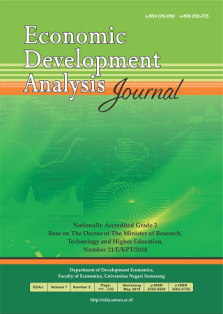Role of Support Infrastructure and Information System on Non-Cash Transaction Policies
Abstract
The transaction system in local governments has undergone a transition from manual to non-cash transactions. Semarang Regency is one of twelve regions selected as pilot projects. The initial implementation supporting infrastructure has not met the required targets. The existence of manual transitions to non-cash will be followed by different procedures and different information systems. The purpose of this study is to see the effect of supporting infrastructure and information systems on non-cash transaction policies and see the influence of supporting infrastructure on information systems. This research is a quantitative research, with variables of quality, quantity, perceptions about the ease of use, perceived usefulness, attitudes toward use, behavior to keep using. Sampling uses census sampling with 71 treasurer respondents. The method of data analysis uses SEM-PLS with software WAPLS 6. The results of the research obtained that the supporting infrastructure has no influence on non-cash transaction policies. Information systems affect the non-cash transaction policy. Supporting infrastructure affects information systems.


